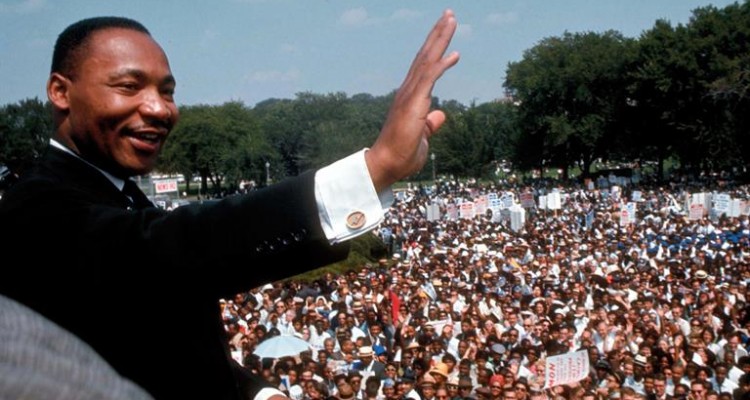Political adviser, counsel and draft speechwriter for Martin Luther King, Jr., Clarence Jones honored King’s legacy during his keynote speech celebrating MLK Convocation week.
“If you were fortunate enough to be alive from 1956 until April 8, 1968, and you went outside at night during that period … and you saw a shooting star … more bright and incandescent than any other shooting star in the heavens, that shooting star was Martin Luther King Jr.,” Jones said. “It is unlikely that we will ever, ever, ever see that shooting star again.”
Alongside the MLK Committee, Wylie Smith Blake of Campus Ministry and Kris Sealey, associate professor of philosophy, organized “Dare to Dream” to celebrate the life and influence of King. Activities included “Poetry for Peace” and a memorial march around campus.
The Convocation on Feb. 4 at the Regina A. Quick Center for the Arts, three members of the University community were presented with this year’s Vision Awards: Nicole Davidow ‘15, Jocelyn Boryczka, associate professor of politics and Will Johnson, associate dean of students.
“This is an honor both as we attempt to live up to King’s hopes and dreams in what we do and an honor to work with the hardest working committee at Fairfield U,” said Blake. “Dr. King said, ‘intelligence plus character — that is the goal of education,’ … and so for this evening we concentrate on Dr. King’s legacy of equality and the question of, ‘Have we done enough?’”
‘TELL THEM ABOUT THE DREAM’
Jones is the first diversity professor at the University of San Francisco and a scholar writer in residence at the Martin Luther King, Jr. Research and Education Institute at Stanford University, according to a university press release.
While most famously known for assisting King in drafting the “I Have a Dream” speech delivered at the March on Washington, Jones refused to call himself a draft speechwriter.
“We collaborated on what [King] might say, and what I simply did was give him a written summary,” Jones said. “The only difference was this time I gave him an example of how he might actually say it.”
Recounting that fateful day on Aug. 28, 1963, Jones remembered standing 50 feet behind King and not realizing “until the sixth or seventh paragraph that [King] was actually going to use that which I had suggested. The speech was his speech.”
King was interrupted during the speech by gospel singer Mahalia Jackson, who said, “Tell them about the dream, Martin,” Jones remembered. What the videos of the speech don’t usually show, he added, was that King turned his text over and began speaking spontaneously.
“I’ve never heard any human being speak the English language with such power,” Jones said.
Bringing Equality to Fairfield
In response to the deaths of Michael Brown, Eric Garner and Tamir Rice in 2014, students organized protests on campus last fall semester to demonstrate against police brutality and social injustice.
The protests included a die-in in the DiMenna-Nyselius Library that attracted about 50 students, faculty and members of the Fairfield community, known as #RacialJusticeIsSocialJustice.
During the MLK convocation, President Jeffrey von Arx, S.J. referenced the protests in saying this has been a year where the “stubborn racial prejudice” has been brought to Fairfield’s campus.
“Even some racial instability in our campus has highlighted once again why it’s important we do this every year … to reaffirm our willingness in a free and just society,” von Arx added.
In light of recent protests in the U.S. against police brutality, the question becomes whether or not the dream King called for will ever be attained.
“Yes it will,” Jones said. “I can’t give you a definite solution. I just know that there will be a solution.”
In remembering the words of King, Fr. George Collins S.J., said, “Our lives begin to end the day we become silent about things that matter.”
Jones suggested to those protesting: “Keep it nonviolent, disciplined and stay away from provocateurs. Reach out across sections of the community.”
“All lives matter in the face of police brutality,” Jones added. “It’s not just black lives.”
For students, the Convocation was a way to connect with memories from the civil rights movement, but to also remember that issues of social injustice are still pertinent.
“I was a little star struck that we had Dr. Clarence Jones come and talk to us,” said Jesuit Universities Humanitarian Action Network fellow Deirdre McElroy ’17. “It was amazing to talk to and have a chance to hear from someone who was so close to Dr. King and had a role in the civil rights movement.
For Tim Manning ’15, it was significant that Jones related his speech to today’s issues.
“Jones said the issues that King would care about today are: voting rights, income inequality and 24/7 gun violence, which is the greatest challenge to his legacy,” Manning said. “One thing he pointed out was that there is no single leader today like MLK was during the civil rights movement, which makes it difficult to organize when you don’t have someone to look up to.”
According to Jones: “Nothing is more powerful than the power of love. Nothing is more engaging than when we become infected and consumed with the virus of compassion.”


Leave a Reply